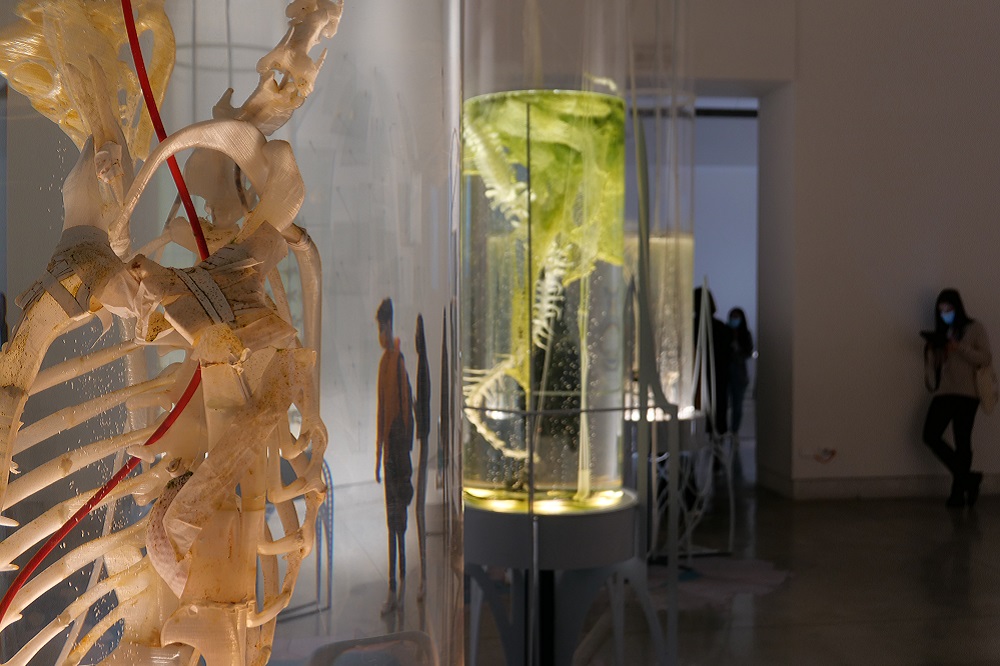The 17th International Architecture Exhibition – the entire series, including the art section, is known as La Biennale di Venezia – ran from 22 May to 21 November 2021, with the Salon Suisse curated by architect and publicist Evelyn Steiner. On 18 November 2021, the event “Jethro Knights, Armor Guyver, and Mutant X: How transhumanists challenge architecture” took place. Prof. Dr. Oliver Bendel gave a talk on “Human and animal enhancement in the context of architecture”, followed by a discussion with Mike Schaffner (a Swiss cyborg) and Prof. Dr. Georg Vrachliotis (an architect at TU Delft). First, the information and machine ethicist clarified key terms such as “human enhancement”, “animal enhancement”, “biohacking”, “bodyhacking”, “cyborg”, and “transhumanism”. He also brought in his own terms “robot enhancement” and “reversed cyborg” or “inverted cyborg”. He then presented examples of human enhancement and animal enhancement, including in the context of architecture: cats with chips getting into the house, humans with chips bringing the smart home to adaptations, animals and humans with chips and transmitters detected in time in traffic, and enhanced and improved organisms that can live on alien planets. He concluded by offering ethical considerations. He was open to the idea of cyborgs and critical of the transhumanism movement. The booklet on Salon Suisse is available here.
Chips, Devices, and Machines within Humans
In September 2021, the book “Mensch. Maschine. Kommunikation.” will be published. It is edited by Sarah Brommer and Christa Dürscheid. One chapter (by Oliver Bendel) is in English and is entitled “Chips, Devices, and Machines within Humans: Bodyhacking as Movement, Enhancement, and Adaptation”. From the abstract: “This contribution about bodyhacking as movement, enhancement, and adaptation has three purposes. First, it aims to clarify terms in this field or to draw attention to the fact that they are used differently. Second, it wants to shed light on and explore a phenomenon that has a history but is also making history at the moment. Third, it wants to bring possible fields of application into play which remain unexplored, or which lie in the future. Literature analysis and own considerations and conclusions are used. The article first defines and distinguishes ‘biohacking’, ‘bodyhacking’, ‘human enhancement’, ‘animal enhancement’, ‘cyborg’, and ‘transhumanism’. It then addresses selected examples of bodyhacking. The author lists typical and known applications, ordered by their different objectives. He discusses actual and potential developments, for example as a response to potential crises and disasters (including pandemics) and in the context of satellites and foreign planets. On this basis, a brief philosophical discourse takes place leading to a summary and outlook. It turns out that bodyhacking brings opportunities with it, especially for the self-determined person, who takes his or her own body as a starting point and deals responsibly with the potentials. In this way, it can break with outdated conventions and create a new view of the body and its relationship with the environment. Moreover, it promises solutions to present and future problems. Of course, it also harbours moral and health risks.” The book is available for pre-order now. More information via www.narr.de/mensch-maschine-kommunikation-18471-1/.
Bodyhacking at Salon Suisse
“Bodily Encounters” is the title of the Salon Suisse at this year’s Architecture Biennale in Venice. On Thursday, 26 November 2020, a lecture by Prof. Dr. Oliver Bendel on bio- and bodyhacking will take place in Palazzo Trevisan, followed by a discussion with Mike Schaffner and Prof. Dr. Georg Vrachliotis. Biohacking can be defined as the use of biological, chemical or technical means to penetrate organisms or their components in order to change and improve them. The combination of organisms is also possible, creating real-life chimeras. A subsection of biohacking is bodyhacking, in which one intervenes in the animal or human body with biological and chemical, but above all technical means (computer chips, magnets, devices of all kinds, exoskeletons and prostheses), often with the aim of animal or human enhancement and sometimes with a transhumanist mentality. Oliver Bendel is an information and machine ethicist and has been working on human enhancement and animal enhancement for years. Georg Vrachliotis is a professor of architecture, Mike Schaffner is a transhumanist. The Salon Suisse program is available here.


